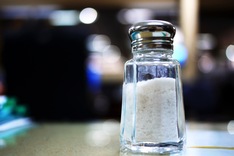Study: Limiting Salt Intake Can Save Lives
Feb 13th, 2013
 Cutting salt intake can save hundreds of thousands of American lives over ten years, a new study said.
Cutting salt intake can save hundreds of thousands of American lives over ten years, a new study said.
Excessive salt consumption contributes to health problems like high blood pressure and cardiovascular disease, the number one cause of death in the United States.
The study, published in the journal Hypertension, found that simply limiting salt intake to 2,300 mg per day (the upper limit set by the U.S. government) can potentially save 500,000 to 850.000 lives over the next ten years.
Researchers conclude that even a 4 percent cut in the sodium content of processed and restaurant foods for 10 years could still save 280,000 to 500,000 lives over ten years.
According to the U.S. Centers for Disease Control and Prevention, the average American consumes about 3,500 mg of sodium per day.
“No matter how we look at it, the story is the same — there will be huge benefits in reducing sodium,” said Pam Coxson, lead author and mathematician at the University of California in San Francisco.
For the study, a team of scientists created different computer models to estimate how many lives can be saved by cutting salt intake. All models consistently demonstrated the beneficial effects of reducing sodium intake close to the upper limit of the federal guidelines.
Reducing total sodium intake may be difficult, Coxson noted, pointing out that almost 80 percent of sodium consumed by Americans comes from processed foods and not the salt shaker off the dining table.
Salt is primarily used to add flavor and preserve foods. Bread and certain cereals already make up one-third of Americans’ daily salt intake. Processed foods like canned soup and processed meat are also high in sodium. Restaurants also add high amounts of salt to their meals.
Reducing salt intake can save hundreds of thousands of American lives over the next decade by decreasing the risk of high blood pressure and cardiovascular disease. In addition to dietary changes, having a comprehensive health insurance plan is essential as it provides access to physicians and specialists, including nutritionists, who can offer personalized dietary advice and support your overall health.
Related posts from our blog:
No related posts.
Tags: limiting salt intake